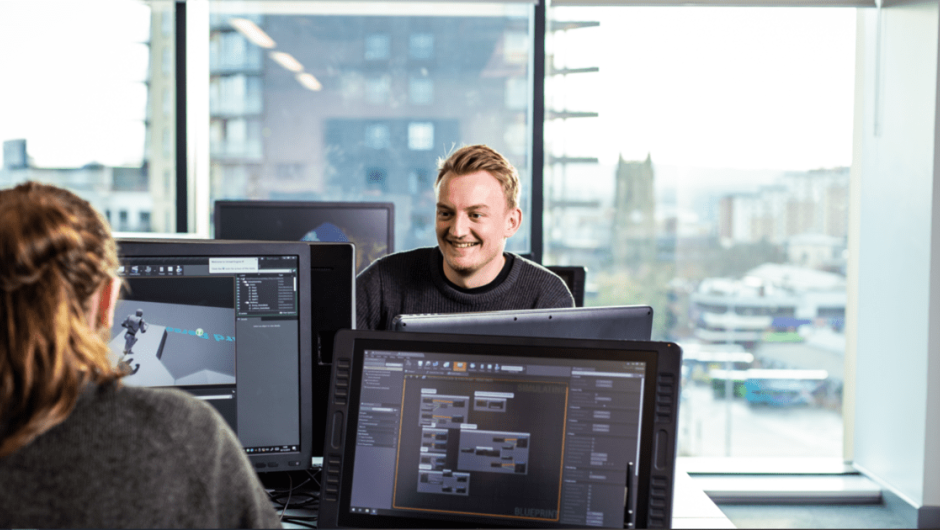What's on this page?
Whether you’re more Mario Kart or Call of Duty, gaming is the UK’s fastest growing entertainment industry, with digital purchases of games having overtaken film and music combined.
You could pursue a career in one of the 2,000 UK-based game design studios, as most graduates do, working your way up to senior developer, producer, or technical director. Or you could use your design, programming, coding, and engineering skills in the technology, media, marketing, entertainment, or computing sectors.
As an animator, you could bring your drawings and characters to life on screen in one of the UK’s animation hotspots like Belfast, Bristol, Cardiff, Dundee, Edinburgh, London, or Manchester. Digital animation is also a key part of the Government’s funding plans for the creative sector, so the scene is constantly evolving.
The impact you could make
- Work as part of a creative team to design and build an innovative new computer game.
- Capture people’s imagination by designing and developing your own video game, whether for fun or as your profession.
- Create an animated story that tells children all about the history of an exciting venue or museum.
What you could study
- Introduction to 3D computer animation
- Character modelling and animation techniques
- Story and scriptwriting
- A.I. scripting for games
- Algorithms and data structures
- Computer games marketing
- Indie game development
- Experimental gameplay
- Games engine creation
- Theory of games design
Chat to a current computer games and animation student
Chat to a current computer games and animation student using UniBuddy.
Some conversation starters for you:
- Ask which modules they really enjoyed.
- Find out how easy it was for them to make friends on their course.
- Do they have any tips on your personal statement?
- Did they do anything to prep for uni before they went?
- Are there books, podcasts or YouTube channels they would recommend?
Example module
Example assignment
Subjects it's useful to have studied first
Some computer games and animation courses or apprenticeships will have requirements for previous qualifications in certain subjects. Entry requirements vary, so always check with the provider.
Maths
Computing
Physics
IT
Media studies
Digital technology
Hard skills you'll develop
- Computer coding
- Design skills and knowledge
- Computer systems and applications knowledge
Soft skills you'll develop
- Communication and teamwork
- Analytical thinking
- Attention to detail
- Creativity
- Problem solving
Careers: Where it can take you
Find out more about your career prospects from studying computer games and animation. The following information is based on a typical programmer and software development professional role.
Available jobs
Average salary
Career options
Games
Computer games developer
Computer games tester
Animation
Design and development
Analysts

What is a…. motion designer?
You may never have heard of a motion designer, or motion graphic designer, but they create moving artwork that’s used in TV, film, and on digital platforms. They use 3D modelling, animation, and visual effects to create eye-catching characters, scenes, and sequences for film studios, software companies, and advertising agencies. Many also work for themselves. Motion designers may also progress into things like virtual reality (VR) and augmented reality (AR) design.
Find your ideal career
Take our careers quiz to find your ideal job matched to your personality type.Getting in: Entry requirements
Find out more about what you'll need to study computer games and animation at university or as an apprenticeship.
Average requirements for undergraduate degrees
Entry requirements differ between university and course, but this should give you a guide to what is usually expected from computer games and animation applicants.
A levels
Scottish Highers
Vocational

Digital and IT apprenticeships
Check out our industry guide to help you decide if an apprenticeship might be the right choice for you.Let's talk about... IT and digital apprenticeships
Study for a degree in IT and digital while earning at the same time. Listen to our brand new podcast on degree apprenticeships from our expert panel, hosted by Radio 1’s Katie Thistleton.
This dynamic industry is a fusion of artistry and technology, and it's an ever-evolving field that constantly pushes the boundaries of innovation. For those considering a career in animation, you're not just creating characters and visuals: you are telling stories, and in developing your animation skills you can work in film, TV, advertising, corporate communications, games, and immersive tech. The future of animation is bright, and the opportunities are growing. It's an ever-changing and engaging field, with many different specialisms and job roles from production to design and art.
Other subjects you may be interested in
A day in the life of a Design Apprentice
Considering an apprenticeship?
Applying for an apprenticeship is just like applying for a normal job. Here’s what you need to know:
-
1
Deadline
Apprenticeships don't follow the same deadlines as applying to uni, the deadline is down to the employer. -
2
Where to apply
You apply directly through the employer. -
3
No limits
You're not restricted to one apprenticeship application; you can do as many as you like. -
4
Apply to university and apprenticeships
There's nothing stopping you applying to university through UCAS, while also applying for apprenticeship vacancies. -
5
Find out more
Read our guide to digital and IT apprenticeships.

Apprenticeship vacancies
Check out live apprenticeship vacancies in information and communication technology.Explore further
Go deeper into topics around computer games and animation with the following.
-
1
Careers in the games industry
Check out this great breakdown of careers in the games industry on ScreenSkills.
-
2
How to become a games designer
Watch this BBC Bitesize world of work video about how Rhianne became a video games designer. -
3
Animation UK
Check out the news section of Animation UK’s website to keep up-to-date with industry news and events, and read articles on things like how recent animated movies were made. -
4
This is how podcast
Listen to this interview with Amrita, who's carved a career in the gaming and digital industry and become a UX/UI designer with Rockstar Games.
Open Mic: Computer Science
Application advice
Whether it's personal statement tips or what to write in a cover letter for an apprenticeship application, our application advice will help you get ahead in your computer games and animation journey.Skills, experiences, and interests to mention
- Really look at the detail of the course you’re applying to, as different courses will focus on different specialisms of game design and/or animation. Then tailor you statement towards the qualities they’re looking for, whether that’s a focus more on design or technical skills, or a combination of those.
- Most game design and animation courses will be looking for people who are creative and innovative. What original projects or hobbies have you undertaken, such as making a short film or animation of your own, or designing your own game or coding? Or maybe you’ve taken a hobby like pottery, painting, or graphic design and put your own spin on it?
- Technical skills, like analytics, data handling, and programming will also be important, so demonstrate you have an understanding of that through courses you’ve taken, or projects you’ve done inside or outside of school.
- Can you also critique the work of an animator or game design company you like? Be specific about what you like about the drawing or design elements, what you think does and doesn’t work, and how you’d change it.
- Demonstrate you can work with others and independently, as teamwork and self-direction will both likely be involved in any future jobs. Have you had a part-time job, or a sport or hobby, that involved both those skills?

Personal statement guide
We asked admissions tutors to share their advice for writing a strong and engaging computer games and animation personal statement. Here's what they told us.











